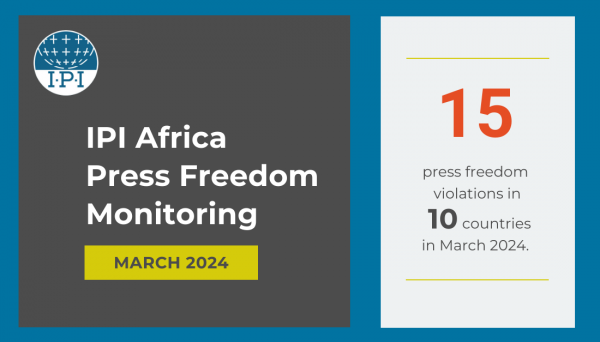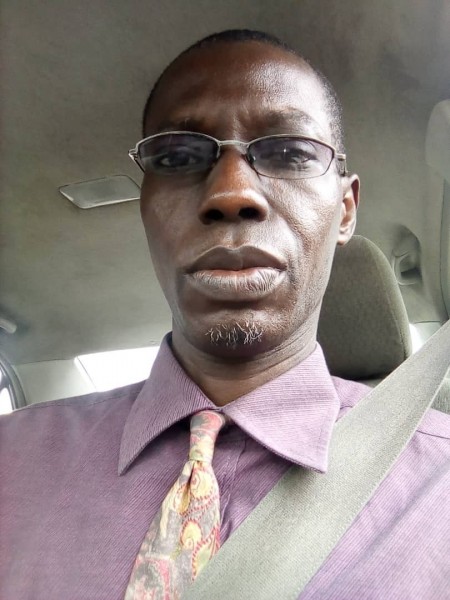Efforts by the governments and conflicts have become a major obstacle in reporting on COVID-19 pandemic in Africa. Journalists are struggling to get accurate information from their governments, which are attempting to control the public narrative about the unprecedented health crisis, according to panellists who participated in a webinar jointly organized by the International Press Institute (IPI) a global network of editors, media executives and journalists, and the Economic, Social and Cultural Commission of the African Union (AU-ECOSOCC) on July 15 to raise awareness about the challenges faced by journalists in covering the health crisis in Africa.
Moderated by global news editor of Politico and member of IPI Executive Board John Yearwood, the panellists in the webinar included the Coordinator of the Southern Africa Regional Collaboration Centre (SARCC) of CDC Africa Dr. Lul Riek, the Head of Communication at the African Union Commission Wynne Musabayana, the Secretary General of the African Editors’ Forum Makan Koné as well as journalists Dapo Olorunyomi, Erik Charas, Faseka Tadesse and Diane Uwimana.
The speakers highlighted several key issues regarding the challenges in covering the pandemic. Lack of reliable data and information especially at the beginning of the pandemic was a major obstacle for journalists, and the absence of legitimate sources lad to the rise of fake news and misinformation as people turned to social media platforms for information. “Social media has become the main source of information for COVID-19, but sadly a lot of the information is false. Fake news spread there faster than fact checked, professional journalism”, said Riek.
“The situation is fluid and facts change, and this can cause fear and confusion. As journalists we have the responsibility to be upfront about the facts and new research and be on top of the situation, break down the new concepts and clearly explain them to the people”, Musabayana said.
Musabayana underscored the importance of debunking myths and providing citizens with correct facts about COVID-19 to remind everyone of the preventive practises. “We, journalists and communicators, are the first line of defence. We have large portions of population who don’t know how to perform the practises against COVID-19 such as testing, proper hand washing and self-isolation. We need to get to the communities with this vital information. People need information on local level in their local language. It is the responsibility of the local news stations to keep even the most rural communities informed”, Musabayana said. She also reminded that journalists should narrate stories of Africans so that the readers and audiences could relate to and report also about the successes in different parts of the continent.
“We need reliable sources for statistics. Journalists are trying to struggle against the wrong and false information”, Burundian journalist and former head of English Desk, Diane Uwimana, said.
“The situation is fluid and facts change, and this can cause fear and confusion”, Musabayana said. “Journalists have the responsibility to be upfront about the facts and new research and be on top of the situation, break down the new concepts and clearly explain them to the people. It is the responsibility of the local news stations to keep even the most rural communities informed in their local languages.”
Most of the journalists in the webinar pointed out the economic hardship media outlets were facing due to the pandemic. “The business model of media has taken a big hit due to the declining number of advertisers. Many media outlets in Nigeria had to close due to economic difficulties”, the publisher of Premium Times Nigeria Dapo Olorunyomi said.
Another issue that journalists raised was the lack of cooperation by the governments in countries where press freedom is severely suppressed. “Due to the state of emergency in the country, we are only allowed to report about official data. We are only allowed to listen to the government, and therefore COVID-19 brought in an opportunity for the government to restrict journalists even more than before”, Erik Charas, a journalist and founder of @Verdade from Mozambique, said. “Numbers the government is providing do not make sense when comparing them to the numbers in neighbouring South Africa.”
Wars and political unrest have made it extremely difficult to report about COVID-19. “Journalists were occupied reporting of the war and humanitarian crisis in Ethiopia and couldn’t pay much attention to the pandemic”, Fasika Tadesse, Bloomberg journalist and the former editor-in-chief of Addis Fortune, said. “Journalists also face the risk of contracting the virus themselves while trying to report on the field.”
All attending parties of the webinar underscored the importance of press freedom and fact-based reporting regarding COVID-19. Keeping the public informed and educated are one of the key tools for tackling the pandemic. It is vital that African journalists are able to report about the public health crisis independently. Cooperation and knowledge exchange between journalists, government officials and medical professionals are essential for accurate reporting.


